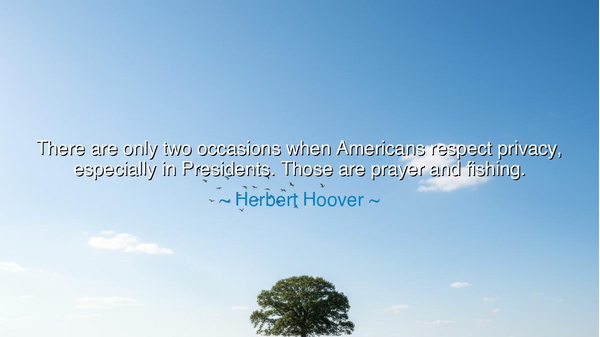
There are only two occasions when Americans respect privacy
There are only two occasions when Americans respect privacy, especially in Presidents. Those are prayer and fishing.






The words of Herbert Hoover—“There are only two occasions when Americans respect privacy, especially in Presidents. Those are prayer and fishing.”—carry both wit and weight, like a jest that hides a deeper truth. At first, it seems a playful remark, a smile tossed into conversation. Yet within it lies a meditation on leadership, solitude, and the curious relationship between the public and its rulers. For Hoover, who bore the burdens of the presidency during one of the darkest storms of the American republic, privacy was not a luxury, but a rare and precious refuge.
The meaning at the heart of Hoover’s words is this: that public figures, especially Presidents, are rarely permitted the solitude that ordinary souls take for granted. Their lives are under constant watch, their actions scrutinized, their words weighed by millions. And yet, Hoover observes, there remain two sacred spaces where even the watchful eye of the nation softens—prayer, where man communes with God, and fishing, where man communes with nature. In these acts, Americans seem to understand instinctively that solitude must be respected, for it touches something higher than politics.
The ancients too recognized such sanctuaries. In Greece, even kings laid down their crowns when entering the temple, for before the gods, all men were equal in silence. In Rome, the generals withdrew from the clamor of the Forum to pray before battle, and their solitude was honored. Likewise, in the East, emperors hunted or meditated in gardens as acts of restoration, moments where the weight of rule was lifted. Hoover’s words echo this ancient truth: that leaders are still men, in need of moments where the soul may breathe.
History offers vivid illustration. Consider Abraham Lincoln, who during the Civil War often stole away to the quiet of his study, bowing in prayer for guidance. In those private moments, unseen by the crowd, he drew the strength to endure the nation’s agony. Or think of Dwight Eisenhower, who loved the stillness of fishing, finding in it a kind of meditation that steadied his mind amidst Cold War tensions. Both men exemplify Hoover’s wisdom: in prayer and fishing, solitude becomes not escape, but renewal.
There is also in Hoover’s words a subtle reflection on the American spirit. Americans, fiercely democratic, often distrust the privacy of power, fearing secrecy breeds corruption. Yet they also carry a deep respect for individual conscience and communion with the divine, as well as for the rugged solitude of the outdoors. Thus, they instinctively grant leaders space in these two realms, seeing them as free of political ambition, and therefore deserving of reverence. Hoover’s jest, then, is also an insight into national character.
The lesson for us is clear: we must honor the sanctuaries of others. For whether in prayer, fishing, or any act of private renewal, every soul requires space to listen to its own heart, to commune with the eternal, to lay aside the weight of duty and breathe. Practically, this means respecting the boundaries of others, offering them solitude without suspicion, and carving out such sacred moments in our own lives. A man who never retreats into silence loses clarity; a leader who never finds privacy loses wisdom.
Thus, Herbert Hoover’s words endure not merely as humor, but as counsel for all ages: privacy is a sacred refuge, and in it, the spirit is restored. Let us then protect it—not only for leaders, but for ourselves and for all those we love. For in prayer, the soul touches the eternal, and in fishing—or any communion with nature—the soul is steadied by creation itself. These moments of solitude are not weakness, but strength; not idleness, but preparation. In them lies the quiet power that makes the burdens of life bearable, and the call of duty endurable.






AAdministratorAdministrator
Welcome, honored guests. Please leave a comment, we will respond soon